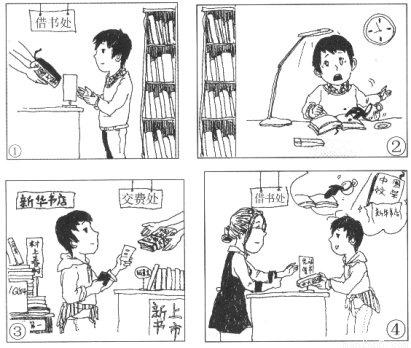题目内容
假设你是红星中学高二(1)班的学生李华。下面四幅图描述了你从图书馆借书及以后发生的事情, 请根据图片的先后顺序, 为校刊“英语园地”写一篇短文。词数不少于60。

___________________________________________________________________________
___________________________________________________________________________
___________________________________________________________________________
___________________________________________________________________________
___________________________________________________________________________
___________________________________________________________________________
I borrowed a book from the library the other day and took the book home. One evening, having finished supper, I went back to my room and started to read the book I had borrowed. I was so absorbed that I knocked the coffee cup over by accident, pouring the coffee onto the book. Wet through and coloured brown, the book turned out to be a mess. Of course, I couldn’t return the dirty book and the loss should be covered. The next day, I went to the bookstore, where I finally find the same copies of the book and bought one. When I returned the new book and explained the reason, the librarian accepted the book and praised me for my honesty and responsibility.
【解析】
试题分析:题目要求根据图片上的内容,为校刊“英语园地”写一篇短文。写作要点必须包含四幅图所显示的内容,不能有遗漏。词数不少于60词;不要出现标点和拼写错误,尽量保持卷面整洁、字体美观;注意行文的连贯性。
亮点说明:范文涵盖了所有的写作要点,进行了适当的拓展,并注意语句的连贯性;范文还使用了定语从句、非谓语动词等语法知识,使句式变得多样,具备较强的语言运用能力。
语法方面:非谓语动词having finished supper和pouring the coffee onto the book与Wet through and coloured brown;定语从句I had borrowed和where I finally find the same copies of the book;结果状语从句so absorbed that I knocked the coffee cup over by accident等,语法知识运用娴熟,显示了较强的语法功底,也使作文句式变得多样;
篇章结构方面:范文注意使用and, one evening, of course, the next day等来衔接句子和段落,使表达变得更有条理;
短语和搭配方面:范文使用了the other day, go back to, by accident, turn out to be, praise sb for sth等短语和搭配,使作文的内容变得充实。
考点:看图类作文

